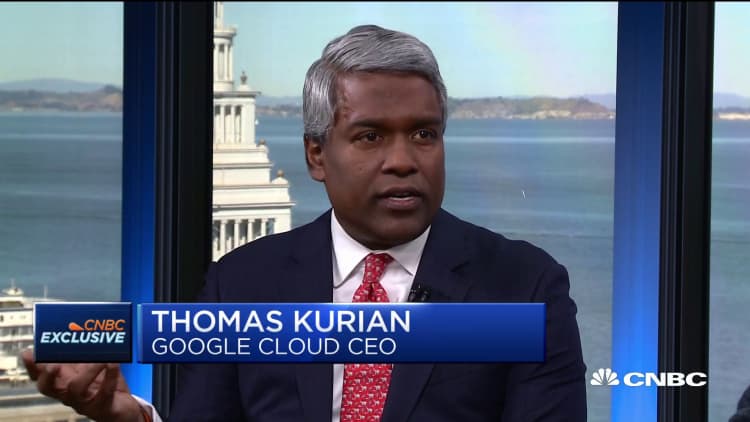
Thomas Kurian, the incoming head of Google Cloud and formerly president of product development at Oracle, speaks at the Oracle OpenWorld conference in San Francisco on Sept. 24, 2013.
David Paul Morris | Bloomberg | Getty Images
Google is restructuring its Cloud group internally, which will include eliminating some roles, a Google spokesperson confirmed to CNBC.
Dow Jones was the first to report the story.
“We recently communicated organizational changes to a handful of teams that will improve how we market, partner, and engage with customers in every industry around the globe,” a company spokesperson said in an email to CNBC on Friday. “We made the difficult, but necessary decision to notify a small number of employees that their roles will be eliminated.”
The restructuring comes as CEO Thomas Kurian has been at the helm for one year. In that time frame, he’s made a number of changes, mostly additions to the headcount, which he and Alphabet CEO Sundar Pichai have boasted of over the last few quarters.
The restructuring is primarily meant to realign focus on international markets and affects fewer than 50 employees, according to a person close to the company. The company would not comment on how many employees are affected or which areas within the Cloud business would be affected, only saying it is working with internal “mobility teams” to find the employees new roles within the company.

“We are grateful for everything they have accomplished and their commitment to Google Cloud,” the spokesperson said.
Kurian this week outlined the company’s strategy, which included targeting five industries: retail, health care, financial services, media and entertainment, and manufacturing.
Alphabet broke out Cloud revenue numbers for the first time in its fourth-quarter earnings report. Google’s cloud business generated $8.92 billion in revenue in fiscal 2019, compared with $5.84 billion in 2018, and the company claims it’s on a $10 billion annual run rate.
While that growth is impressive, Amazon Web Services booked more than $35 billion in revenue last year, and analysts including Synergy and Gartner put it in firm first place in terms of market share, with Microsoft as the clear No. 2.
